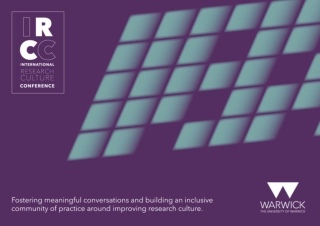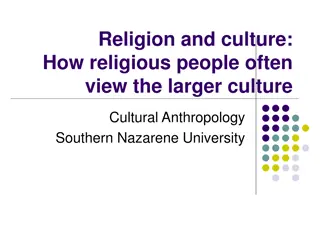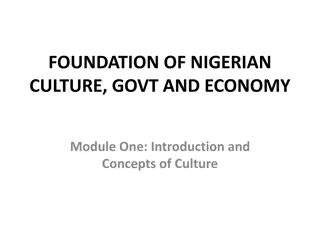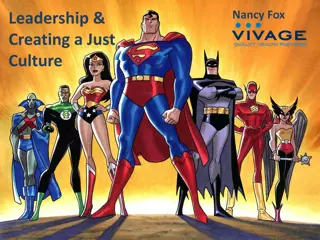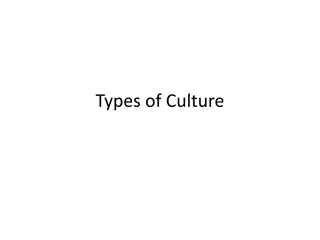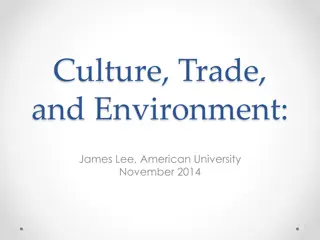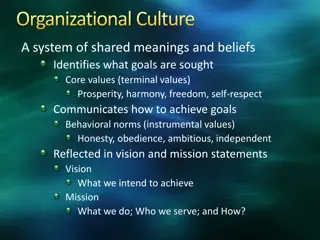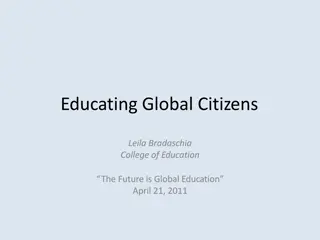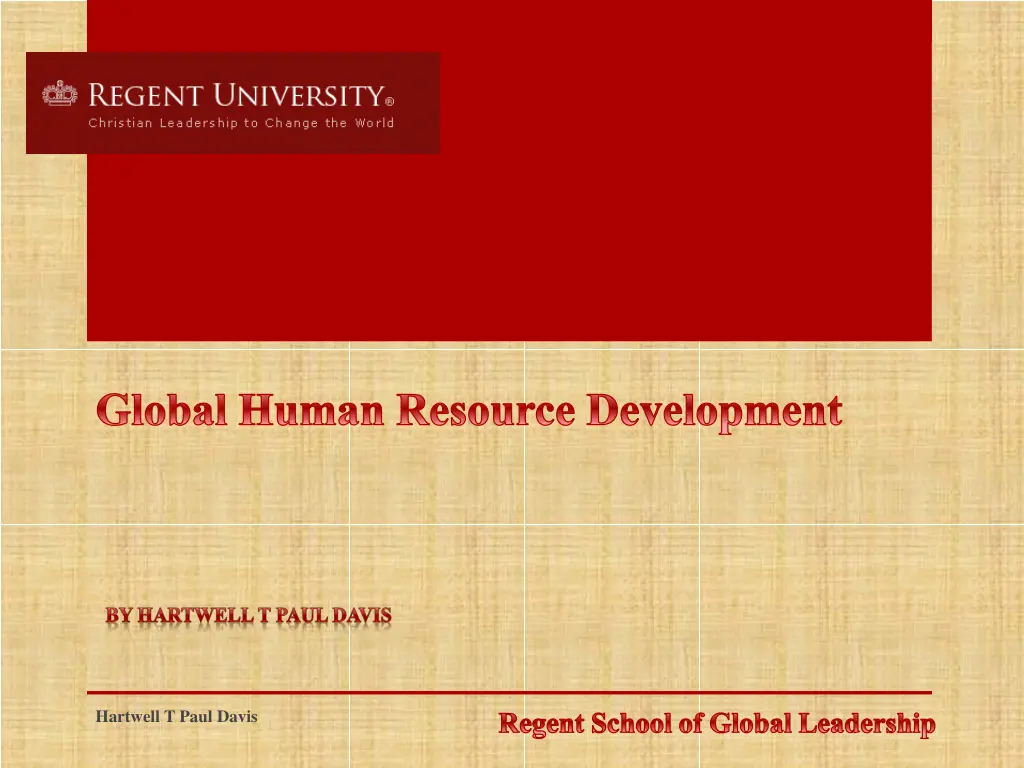
Understanding Cultural Diversity and Its Impact on Society
Explore the significance of cultural diversity in preventing abuses, maintaining balance of power, promoting innovation, and fostering relationships. Learn about the purpose of culture, dangers of ethnocentrism, and the value of acculturation in Global HRD research. Discover how cultural diversity safeguards against oligarchical collectivism and its influence on societal structures.
Download Presentation

Please find below an Image/Link to download the presentation.
The content on the website is provided AS IS for your information and personal use only. It may not be sold, licensed, or shared on other websites without obtaining consent from the author. If you encounter any issues during the download, it is possible that the publisher has removed the file from their server.
You are allowed to download the files provided on this website for personal or commercial use, subject to the condition that they are used lawfully. All files are the property of their respective owners.
The content on the website is provided AS IS for your information and personal use only. It may not be sold, licensed, or shared on other websites without obtaining consent from the author.
E N D
Presentation Transcript
Global Human Resource Development Regent School of Global Leadership Hartwell T Paul Davis
Genesis 11:5-6 (KJV) 5 And the LORD came down to see the city and the tower, which the children of men builded. 6 And the LORD said, Behold, the people is one, and they have all one language; and this they begin to do: and now nothing will be restrained from them, which they have imagined to do. The value of cultural diversity is the protection it gives preventing all of humanity from being enslaved by mediocrity as well as by oligarchical collectivism H T Paul Davis
Research Questions in Global HRD What is the purpose of culture? What are the dangers of ethnocentrism? Should HRD seek to homogenize training practice or adapt practice to cultural norms? What is the importance of acculturization? Are their potential negative effects from the current global megatrends? What is the importance of cultural training?
Purpose of Culture
Cultural diversity is Gods way of preventing excessive abuse over humanity Prevents oligarchical collectivism by distributing governmental powers Provides an economic check and balance by distributing control of wealth and resources Prevents a one world governmental system Distributes knowledge, preventing a centralization of knowledge management and thus power Prevents humanity from being enslaved by mediocrity Creates and promotes innovation in products based on diverse needs and wants Stimulates relationships, curiosity, and creativity Provides cohesiveness among cultural groups and defines social relationships at both a micro and macro level Purpose of Culture
Oligarchical Collectivism The Theory and Practice of Oligarchical Collectivism from Orwell s Nineteen-Eighty-Four envisions a totalitarian utopian society, socialist in nature, reminiscent of a pre-Babel one world government which was prevented by dividing the nations in the biblical Tower of Babel account in Genesis. Cultural diversity has a direct impact on maintaining a distributed balance of power economically and socially, deserving of our highest respect H.T. Paul Davis For reference: Dalvai, M. (2010). Utopianism Parodied in Orwell s Nineteen Eighty-Four. An Intertextual Reading of the Goldstein Treatise . Orbis Litterarum, 65(5), 388-407. doi:10.1111/j.1600-0730.2010.00991.x
Hypothesis for a Global HRD paper Global HRD should focus on equipping training professionals with strong emphasis on cultural awareness, respect for culture, intent on avoiding ethnocentric policies seeking to change cultures, but rather skill at delivery through acculturization that adapts training to the culture. Megatrends leading to homogenous practice or that attempt to break down cultural barriers are dangerous and could lead to oligarchical collectivism or disrupt the social and economic checks and balances inherent with cultural diversity.
Color blindness versus cultural awareness Do not seek to be color blind ; instead seek to understand and appreciate differences Color blindness seeks to see and treat all people as being the same and ignore characteristic and cultural differences; in effect it is a form of politically correct ethnocentrism Cultural awareness seeks to understand differences that can lead to respect and the ability to develop relationships with those of other cultures
Key Definitions Globalization symbolizes and creates a convergence of economic and social forces, values and taste, challenges and opportunities (Marquardt, Berger, & Loan, 2004, Kindle Loc 83 of 4292) Culture is a way of thinking, acting, and living that is shared by members of a group and that older members pass on to new members (Marquardt et al, Kindle loc 111 of 4292)
Ethnocentrism the belief in the superiority of ones own culture Training is filtered through cultural experience in both the trainer and the learner. Three major areas where ethnocentrism can impact HRD Corporate ethnocentrism: evidenced by the organization presenting training in the same way all over the world Development of foreign managers and trainers: indicates bias by owners, labor unions, governments or by HRD structural functionalism (in-group mentality) Ethnocentrism is the classroom dynamic as multi-cultural personnel engage in corporate training Hartwell T Paul Davis
Cultural Components Hartwell T Paul Davis
Layers of Culture Marquardt, M., Berger, N., & Loan, P. (2004). HRD In the Age of Globalization: A Practical Guide to Workplace Learning in the Third Millennium. New York: Basic Books.
Factors Influencing the Cultural Environment Religion Language Education Economics Politics Family Class structure History Natural resources / geography Marquardt, M., Berger, N., & Loan, P. (2004). HRD In the Age of Globalization: A Practical Guide to Workplace Learning in the Third Millennium. New York: Basic Books., Kindle Loc. 262 of 4292
Variables of Culture Environment Time Action Communication Space Power Personal Behavior Social Behavior Structure Thinking Marquardt, M., Berger, N., & Loan, P. (2004). HRD In the Age of Globalization: A Practical Guide to Workplace Learning in the Third Millennium. New York: Basic Books. (Table 2.2, Kindle Loc 299 of 4292)
Ethnocentrism the belief in the superiority of ones own culture Impact on HRD HRD must adapt practice to the culture by acculturization of training programs Hartwell T Paul Davis
What is acculturization? Acculturization is the conveying of a program (including is objectives, methodologies, materials, and content) across cultural boundaries to ensure that the training program is user-friendly (Marquardt,Berger, & Loan, 2004, Kindle loc. 502 of 4292) Marquardt, M., Berger, N., & Loan, P. (2004). HRD In the Age of Globalization: A Practical Guide to Workplace Learning in the Third Millennium. New York: Basic Books.
Global Training Model Marquardt, M., Berger, N., & Loan, P. (2004). HRD In the Age of Globalization: A Practical Guide to Workplace Learning in the Third Millennium. New York: Basic Books. (Figure 3.1, Kindle Loc 512 of 4292)
Benefits of Globalization Marquardt, M., Berger, N., & Loan, P. (2004). HRD In the Age of Globalization: A Practical Guide to Workplace Learning in the Third Millennium. New York: Basic Books. (Table 10.2, Kindle Loc 1553 of 4292)
Implication of Globalization Globalization is debated by proponents and opponents for various reasons. One implication is the potential for reversing the Tower of Babel effect that provides a balance against oligarchical abuse. However, economic globalization or Christian globalization (missions) share commonalities by reaching across cultural boundaries. Globalization has many benefits as long as organization promote cultural awareness and practice acculturization rather than ethnocentrism in its global mission. Hartwell T Paul Davis

